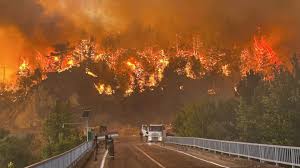2023 Wildfires Devastate Antalya, Turkey

Introduction
In the summer of 2023, Antalya, a region known for its stunning coastlines and rich biodiversity, faced devastating wildfires that raised alarms both nationally and internationally. These wildfires have not only posed a direct threat to the local ecosystems but also highlighted the increasing prevalence of extreme weather events exacerbated by climate change. As Turkey braces itself for a prolonged fire season, the importance of effective mitigation strategies has become ever more paramount.
Details of the Wildfires
The wildfires began in late July and spread rapidly due to scorching temperatures and strong winds, engulfing thousands of acres of forest and residential land. Authorities reported that over 9,000 hectares of land were burned, leading to the evacuation of several villages and tourist resorts.
Response efforts included the mobilization of national and local firefighting teams, assisted by aerial firefighting resources. The Turkish Ministry of Agriculture and Forestry stated that more than 3,000 personnel were deployed to combat the inferno. Despite tireless efforts, the fires outpaced some containment strategies, leading to significant losses in both biodiversity and property.
Impact on Environment and Economy
The environmental repercussions of the wildfires are severe, with estimates indicating that numerous endangered species lost their habitats. The forest fires also emit a considerable amount of carbon dioxide, further contributing to climate change. Economically, the wildfires staggeringly impacted local resorts and the tourism sector, which is crucial for Antalya. Early estimations suggest losses amounting to millions in tourism revenue, where many resorts had to close temporarily, affecting the livelihoods of local businesses.
Recovery and Future Outlook
The recovery dialogue among government officials, environmentalists, and local leaders has started. Reforestation initiatives are being planned alongside policies for better land management to prevent future occurrences. Experts are advocating for a more integrated climate response plan that encompasses not only fire management but also community education and preparedness.
As Antalya continues to deal with the aftermath of the 2023 wildfires, the event serves as a stark reminder of nature’s vulnerability due to climate shifts and the urgent need for strategic environmental policies. The decisions made in the coming months will be pivotal in shaping the resilience of this region against future wildfires.
Conclusion
In conclusion, while the 2023 wildfires in Antalya have created immediate challenges, they have also opened a pathway for much-needed discussions on climate resilience, community preparedness, and environmental protection in Turkey. With effective policies and community engagement, there is hope for a recovery that not only restores what was lost but also fortifies the region against future disasters.
